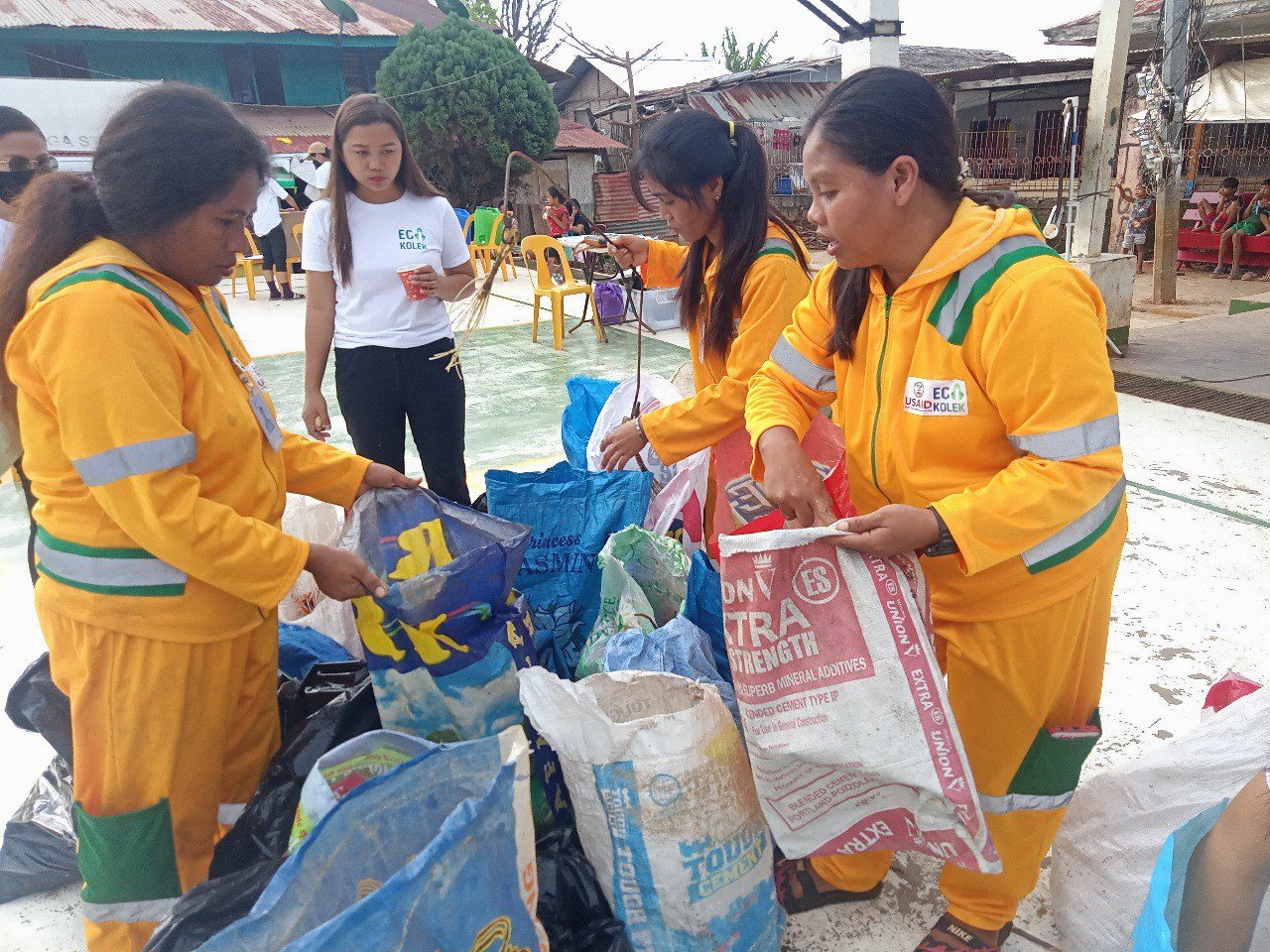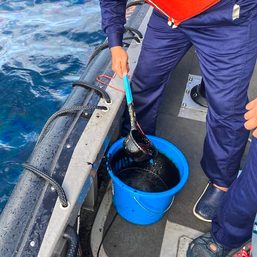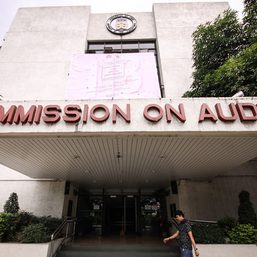SUMMARY
This is AI generated summarization, which may have errors. For context, always refer to the full article.

PALAWAN, Philippines – In Puerto Princesa, where unsorted solid waste reaches an alarming daily volume of 155 to 170 tons, a private initiative is beginning to make waves in waste management. The initiative has empowered informal waste pickers and tripled their incomes while championing the cause against ocean plastic pollution.
The waste pickers used to earn a weekly average of P1,500 each. Now, each of them are averaging P4,000 a week, and the support they have been receiving has made their work, as lowly as it seems, easier for them, said Lydia Casiano, the leader of the predominantly female group Samahan ng Mamamayan ng Jacana (SMJ).
The private group-led waste management project, Eco-Kolek, has been helping the waste pickers, providing them the support that they need, including collection vehicles, uniforms, and training, in collaboration with hundreds of households, establishments, and the local government of Puerto Princesa.
Before the initiative, waste picker Liezl Tibar said she had endured walking and spending most of her time picking plastic bottles, tin cans, cardboard, and other recyclables to earn a meager income.
At the same time, she said, she was aware that her work exposed her and other waste pickers to health risks due to filthy unsegregated solid wastes and felt that their work was undervalued. She said they also suffered stigma due to their kind of work.
“Most of (the people) were unfamiliar with waste segregation. They were not doing it,” Tibar said.
Another waste picker, 22-year-old Jailyn Danguen, a member of the Tagbanua indigenous community, said she has been working as a scavenger for 10 years, enduring the foul-smelling work, but proud and encouraged at the thought that she was doing her share to keep Puerto Princesa’s environment clean.
Danguen also said she has to persevere to help her husband, a construction worker, support the needs of their family while juggling multiple responsibilities as a mother and wife.
Before the Eco-Kolek initiative, much of their time was spent on sorting recyclables, and washing them before bringing them to buyers.
Casiano said the Eco-Kolek project made many households and establishments in the city see the importance of waste segregation at the source, significantly reducing the need for scavenging, which poses health and safety risks for waste pickers.
As a result, the waste pickers, mostly women, have seen substantial increases in their weekly earnings, from P1,500 to P4,000 each.
Casiano, one of the group’s most vocal campaigners for waste segregation at the source, said that if people learn to segregate at home, there will be no more need for scavenging, which is unhealthy and unsafe for waste pickers.
John Gastanes, a social entrepreneur who started the project, said, “Eco-Kolek is driven to create and address the different faces of poverty in the community.”
The Eco-Kolek business model, implemented through Project Zacchaeus Cooperative (PZC), has caught the attention of the Clean Cities, Blue Ocean (CCBO) program of the United States Agency for International Development (USAID) under the Save Our Seas Initiative.
Since 2023, Eco-Kolek has been collaborating with the Puerto Princesa City government and was even given an award by Mayor Lucilo Bayron for the initiative that same year.
Given its unsorted solid waste volume that reaches as much as 170 tons daily, Puerto Princesa is facing challenges in managing solid waste due to issues such as inadequate segregation, collection, transfer, and handling at its final destination. This has been aggravated by weak enforcement of local waste management ordinances, which adds to these challenges, particularly with the rapid growth of urbanization.
Eco-Kolek, a project of the Project Zacchaeus Cooperative (PZC) which availed funding from USAID, has been helping the waste pickers by teaming up with nearly 200 households and businesses in the city who now regularly hand over the segregated recyclables to SMJ, reducing the burden on waste pickers.
With the help of CCBO, Eco-Kolek provided the waste pickers with safety clothes and other work apparel, bicycles and motorcycles with sidecars for faster waste collection and improved routes. The initiative also includes training on waste management, health, safety, recordkeeping, and even driving.
Eco-Kolek has been partnering with the Puerto Princesa City government through its City Environment and Natural Resources Office (CENRO) under Carlo Gomez to strengthen and focus on improving the city’s solid waste management challenges.
Those behind the project, however, said much work still needs to be done because neither Puerto Princesa nor PCZ-Eco Kolek has a recycling facility to turn plastics into pellets.
Presently, plastic bottles are sold for P7 per kilogram in contrast to plastic pellets which can command a price of more than P40 a kilo.
Shellamai Roa, PZC-Eco Kolek’s deputy project director, said they aim to become a buyer of the recyclables with SMJ as their supplier. She said they also intend to become a consolidator and shipper of these materials to Manila-based buyers. Currently, SMJ sells the recyclables to scrap buyers in the city.
Roa said that buying the collected and sorted recyclables requires more resources, and shipping these from Palawan to Manila would cost more than P40,000 for every container van and another P15,000 to P20,000 for land transport costs.
Jan Aldwin Bermeo, PZC’s community-based trainer, said the processing machines are so costly that they have requested support from the Department of Science and Technology (DOST). – Rappler.com
Gerardo C. Reyes Jr. is a community journalist of Palawan Daily News and is an Aries Rufo Journalism fellow of Rappler for 2023-2024.
Add a comment
How does this make you feel?















There are no comments yet. Add your comment to start the conversation.